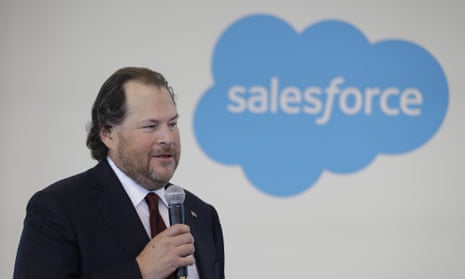Business software pioneer Salesforce.com is buying work-chatting service Slack for $27.7bn in a deal aimed at giving the two companies a better shot at competing against longtime industry powerhouse Microsoft.
The acquisition announced Tuesday is by far the largest in the 21-year history of Salesforce. The San Francisco company was one of the first to begin selling software as a subscription service that could be used on any internet-connected device instead of the more cumbersome process of installing the programs on individual computers.
Salesforce’s flamboyant founder and CEO Marc Benioff hailed the “cloud computing” concept as the wave of the future to much derision initially.
But software as a service has become an industry standard that has turned into a goldmine for longtime software makers. Microsoft for one has developed its own thriving online suite of services, known as Office 365, which includes a Teams chatting service that includes many of the same features as Slack’s six-year-old application.
Slack in July filed a complaint in the European Union accusing Microsoft of illegally bundling Teams into Office 365 in a way that blocks its removal by customers who may prefer Slack.
Microsoft also has been posing a threat to Salesforce’s main products, a lineup of tools that help other companies manage their customer relationships.
“For Benioff, this is all about Microsoft,” said Wedbush Securities analyst Dan Ives. “It’s just clear Microsoft is moving further and further away from Salesforce when it comes to the cloud wars.”
Salesforce has been building on its success in recent years to diversify into other fields, largely through a series of acquisitions. Last year, the company bought data analytics specialist Tableau Software for $15.7bn. Salesforce was also among the companies bidding to buy LinkedIn in 2016 before Microsoft snapped it up.
Slack, on the other hand, hasn’t proven as popular with investors, even though its service that publicly launched in 2014 is being increasingly used by companies and government agencies looking for more nimble alternatives than email. Before news reports of a potential deal with Salesforce surfaced last week, Slack’s stock was still hovering around its initial listing price of $26 when the company went public nearly 18 months ago.
“This is a stellar exit strategy for Slack,” said Kate Leggett, an analyst at Forrester Research. “Microsoft Teams is eating Slack’s lunch.”
But Leggett said it’s also “really good for Salesforce” to add a popular collaboration tool to its own software suite, which is focused on managing customer relationships for businesses and government agencies. She said the need for customer-relations agents and other Salesforce users to swarm around a topic and collaborate remotely has only grown with the coronavirus pandemic that has sent so many office workers home and got many hooked on new online tools.
“I think the pandemic’s played a massive role” in paving the way for the deal, Ives said. “The Zooms, the Slacks, the Microsoft Teams, that’s going to be a new part of the workforce.”
